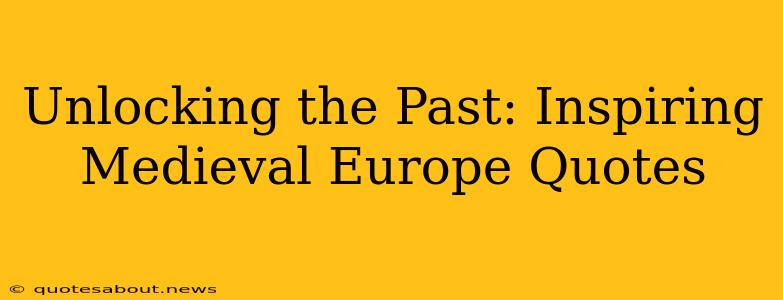The Medieval period, spanning roughly from the 5th to the 15th century, was a time of immense change and upheaval in Europe. From the fall of the Roman Empire to the dawn of the Renaissance, this era witnessed the rise and fall of empires, the flourishing of religious orders, and the slow but steady development of societal structures that would shape the modern world. While often portrayed as a "Dark Age," the Medieval period was a time of significant intellectual, artistic, and philosophical ferment. Exploring the wisdom and wit of the era through its quotes offers a fascinating glimpse into the minds of those who lived through it. This exploration will delve into some of the most inspiring medieval quotes, examining their context and enduring relevance.
What are some famous quotes from medieval times?
This is a question often asked by those interested in exploring the Medieval period. Many famous quotes survive from this era, attributed to various figures, from monarchs and religious leaders to scholars and poets. The quotes often reflect the prevailing religious beliefs, social structures, and political realities of the time. Some are profoundly spiritual, others offer worldly wisdom, and still others provide a glimpse into the humor and everyday life of medieval people. We will explore a few key examples below.
What were the main themes in medieval literature?
Medieval literature was heavily influenced by the prevailing religious beliefs of the time, primarily Christianity. Common themes include:
- Religious devotion and faith: Many works of literature served to promote religious piety and devotion, often focusing on the lives of saints or biblical stories.
- Chivalry and courtly love: The ideal of the chivalrous knight, dedicated to serving his lord and lady, permeates much of medieval literature. Courtly love, a stylized and idealized form of romantic love, was also a frequent theme.
- Allegory and symbolism: Medieval literature often employed allegory and symbolism to convey complex ideas and moral lessons. Stories and poems could have both literal and symbolic meanings.
- Moral instruction and education: Many works aimed to teach moral lessons and educate the reader about religious doctrine and proper conduct.
Who are some notable medieval writers?
The Medieval period boasts a wealth of notable writers whose works continue to be studied and admired today. Some key figures include:
- Geoffrey Chaucer: Author of The Canterbury Tales, a collection of stories told by pilgrims on their journey to Canterbury Cathedral. Chaucer's work provides invaluable insight into medieval English society.
- Dante Alighieri: Author of The Divine Comedy, an epic poem describing a journey through Hell, Purgatory, and Paradise. Dante's work is considered a masterpiece of world literature.
- Christine de Pizan: A highly influential female writer known for her feminist writings and her works defending women against accusations of inherent inferiority.
What are some examples of inspiring medieval quotes?
Let's examine some inspiring medieval quotes and their significance:
-
"The only thing necessary for the triumph of evil is for good men to do nothing." While often mistakenly attributed to Edmund Burke (18th century), this quote embodies a sentiment present throughout medieval literature and thought. It underscores the importance of active participation in upholding justice and morality. The inaction of the virtuous allows evil to flourish.
-
"Faith is to believe what you do not see; the reward of this faith is to see what you believe." This quote, though its exact origin is debated, reflects the deep religious faith that characterized much of the Medieval period. It speaks to the power of belief and the promise of divine reward for unwavering faith.
-
"He who has health has hope; and he who has hope has everything." This quote, though its origin within the Medieval period is difficult to pinpoint definitively, echoes the importance placed on health and well-being in a time when life expectancy was significantly lower. Hope was a vital source of strength and resilience.
These are just a few examples. Many other quotes from the Medieval period offer valuable insights into the lives, beliefs, and struggles of the people who lived during that time. Further research into specific authors and their works will unlock even more inspiring and thought-provoking sayings.
Conclusion:
Exploring medieval quotes provides a unique window into a complex and fascinating period of European history. These quotes offer more than historical context; they resonate with contemporary readers, offering timeless wisdom on faith, courage, justice, and the human condition. The enduring power of these words is a testament to the intellectual and spiritual richness of Medieval Europe, a period often misunderstood and misrepresented. By delving deeper into these expressions, we can gain a richer appreciation for this significant chapter in human history.

